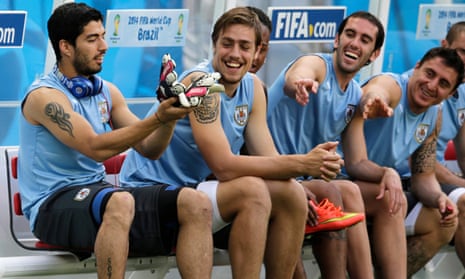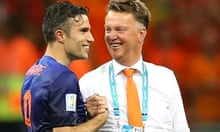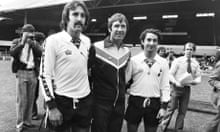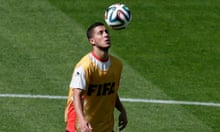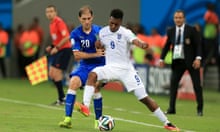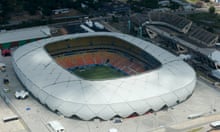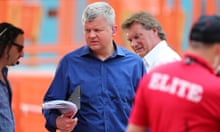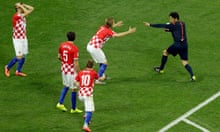The first of the Coates clan left Liverpool and crossed the Atlantic bound for Uruguay in the late 19th century. More than a hundred years on, the latest set off in the other direction, leaving the river Plate for the Mersey. Sebastián Coates eases on to a sofa at Uruguay’s training camp and stretches out long, powerful limbs. Uruguay face England on Thursday night but there can be no divided loyalties and not just because victory is vital after a surprise opening-day defeat to Costa Rica. “In reality, my roots are Scottish,” he smiles.
“The family came here from Scotland three or four generations back. The first one to come to Uruguay, the first Coates, came by boat from Liverpool,” he continues. Sebastián is not sure when exactly, but later he gets the story confirmed. There is even documentary evidence – ship paperwork in the name of Ethelbert Coates, dated 1884. So, it is Coats English-style, then, not Co-ah-tess? “Yes. Well, no. Not now; everyone says Co-ah-tess. I imagine my grandparents may speak a bit, but no one else in the family speaks English.”
Apart from Sebastián, even if to me he speaks in Spanish. He does so slowly, calmly, almost gently. There is an ease to the way he talks that belies his size and hides how difficult things have been since he left Nacional to join Liverpool after Uruguay won the 2011 Copa América, where he was voted the tournament’s best young player. It also disguises how much he wanted to make the squad for this World Cup and the size of the task before them now. Costa Rica was supposed to be the easy game of a terrifying group; now they must beat England and probably Italy too.
Making the squad was a key reason why Coates returned to Nacional on loan in January, as he completed his recovery after tearing cruciate knee ligaments last August. The decision to come was, he admits, psychological as much as physical. It also allowed him to complete his rehabilitation under the watchful eyes of the Uruguayan medical staff – and the coaching staff too.
“Sometimes when you’re injured, what matters most is what goes on in your head. It was six months trying to get fit and maybe I needed to be close to my friends and my family. I also knew that if I stayed at Liverpool I would have fewer chances to play after I had recovered, so I would not be fully back as quickly,” he explains.
Coates admits that he would have liked to play more at Anfield. Signed by Kenny Dalglish and Damien Comolli, with Liverpool getting to him despite interest from some of Europe’s biggest clubs, when Brendan Rodgers took over it was “like starting from scratch”. Coates understood that, he says. He still does, in fact: he is a young defender with established centre-backs ahead of him, all of them playing well.
Opportunities were few and when he first asked for the chance to go out on loan, he was told he was still needed because the squad was short. After the injury, though, he was allowed to return to Nacional’s Parque Central in Montevideo, where he had begun his career. There, he proved himself once more and made the World Cup squad. Suspension for Maxi Pereira and doubts over Diego Lugano mean he may now play.
But he knows that playing for Liverpool is likely to be a different issue, at least in the short term. “It is hard to play every so often, knowing that in the few games you get you have to do everything well. It’s a challenge for me to play weekly and show that I’m a good player. I’ve not really had the opportunity until now.”
He says so calmly, with no hint of recrimination. “I told Liverpool that I want to play and if I don’t have the chance there, it would make sense to look for another way,” he continues. “I wouldn’t mind being loaned and continuing to play in the Premier League. I’d like to play in England, I want to carry on playing for Uruguay and I think it’s important that I maintain a good rhythm of games coming off the back of the injury.”
Given his size and style – he is 6ft 5in tall and powerfully built – it is natural that he sees himself as suited to the English game; having fought so hard to get there, it is also natural that he does not want to stop now. “In the first few months you’re doing pretty much the same exercises every day; it can be repetitive and boring and gets you down,” he admits. “But the hardest part was when I was ready, or thought I was, and the doctors slowed me down. There’s that sense of anxiety. You say to them: ‘I can play.’ But they respond: ‘Wait.’ At that point you think: ‘What more can I do?!’”
Coates’s mother is a physiotherapist, so did he seek advice from her? “No,” he says, smiling, “she probably didn’t want the responsibility! She works with children with Down’s syndrome so it’s different. I used to go to the centre a lot, though, even when I was kid. You see that you moan about nothing sometimes.
“I set a series of objectives, a weekly plan and long-term goals. The first thing was to get through the injury properly and then give myself a chance of going to the World Cup. Fortunately, that happened.”
Coates laughs as he describes how Luis Suárez was acting practically as his agent when he went to Liverpool, always on the phone, and the pair have become close. He was at Suárez’s house to watch the World Cup draw. “That was early in the rehabilitation process and because of my shirt number [16], I changed next to [Daniel] Sturridge [15] at Melwood. He didn’t know yet and I said: ‘Watch out!’ Daniel and I are different but we get on very well. Me and Luis even made him try mate.
And did he like it? Mate is the bitter tea that Uruguayans carry everywhere with them, sucking it through a metal straw. Coates laughs and pulls a face that it is easy to imagine Sturridge pulling. “No!”
Defeat to Costa Rica was a bitter blow but it could be that Italy and England suit Uruguay more. “We have a very hard group but historically we benefit from teams attacking us, opening up, and allowing us to play on the counterattack. We’re more dangerous than ever now because we have two or three of the best strikers around and they can take advantage of the spaces. That may help. England will try to win the game but maybe Italy will wait more.”
England will have familiar faces and might, Coates believes, adopt a Liverpool-style front line with Wayne Rooney as Luis Suárez. “Sometimes it’s helpful to have players who play together for their club and England could set up like Liverpool,” says Coates. “Let’s hope it doesn’t have the same result. Sterling is extremely quick, he goes outside defenders, takes them on, makes things happen and looks to put the ball in the box. Sturridge is similar to Luis: he’s always looking to score, always trying to force the mistake and take advantage. He has a lot of technical ability and when he’s one-on-one it is difficult to stop him.
“They have two of the three but hopefully Luis can show that we have the best of the three,” Coates continues. “He never gives up a single ball for lost, he chases everything. It doesn’t matter if the team is winning or losing, he always wants more. He has really exploded this year but he has always scored a lot of goals – at Ajax, for example. His injury was a pity but he has worked hard to get fit. For me, he is one of the three best players in the world.”
There will be no need for Coates to give his international team-mates the inside track. Uruguay have prepared thoroughly and, being back at Nacional, he saw first hand how the country has followed the Premier League obsessively. “Liverpool might have more fans here in Uruguay than anywhere,” he says, “although it was hard to watch the way it [the title race] ended. We have a WhatsApp group with Luis, Coutinho and Lucas. I sent Luis a message after the Crystal Palace game. There’s not really anything else you can do.
“Within the Uruguay squad we’ve watched videos and the process of studying all of our opponents started a long while ago, so it’s not really a case of me telling them. I will, of course, but [Diego] Lugano knows them already having played for West Brom. He knows their strong and weak points.”
Besides, there is something about Uruguay, a tiny country with an astonishing international record, including a semi-final place four years ago. They have not given up hope yet. They are used to beating the odds. Can you explain the miracle? “No,” Coates says, audibly applying the full stop.
He pauses and thinks. He is open to suggestions too. “We’re very passionate about football but lots of countries are. At times, there is no explanation. Everyone plays from a young age and there may be something in the idea of the garra charrúa, that desperate desire to win. Luis is the perfect example: you never give a game up for lost. In the hardest moments, that garra appears. Keep going, keep going, never give up.”
During their preparations for the World Cup Uruguay’s coach, Óscar Tabárez, asked out loud: “What is Uruguay for? Uruguay is for fighting.” That can be seen in the “baby football” system many kids are brought through, which is so fiercely competitive that Coates didn’t play: his parents wouldn’t let him. Others did, and it had an impact.
“When you’re a kid, sometimes the parents go to the pitch and they want to emulate what happens at first division grounds and they shout and protest. There’s a lot of pressure. And maybe that’s not the best thing for a kid,” Coates explains. “I played with my friends, then I went to Nacional, but I didn’t play baby football. That competitiveness might help explain it and we do export a lot of players too. Maybe that helps when they come back to play for the national team.
“ But when you look at the numbers it is hard to explain. In Brazil I think there are three million players officially signed up with clubs … that’s [as much as] our entire population.”
Ah, Brazil. It’s often said that the fear that hangs over the hosts as they prepare for their World Cup is light blue and how they know it in Montevideo. This World Cup is all the greater for what happened at the Maracanã 64 years ago – another reason why they are so desperate to overcome England and Italy. Then they, perhaps uniquely, would dearly love to face the hosts.
Uruguay inflicted their greatest ever footballing trauma upon Brazil and it is deep in the nation’s conscience and its football culture. Brazil’s ghost is Uruguay’s hope, and is ever-present in Montevideo. On Avenida Brasil recently, every building’s number was changed to 1950.
“It is one of the great feats in the country’s history and people always talk about it, this year more than ever. If you look at the games between the two countries, I don’t really know why but Uruguay have always had something extra against them. There’s a kind of mystique to it,” Coates says. “In Uruguay, you don’t learn about 1950. When you’re born you already know.”
